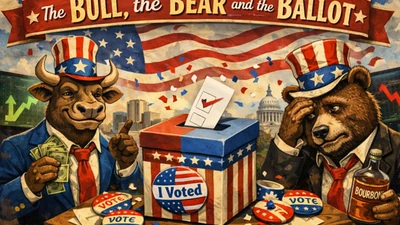Picture this: you’re sipping your morning coffee, scrolling through your portfolio, and wondering whether to bet big on that tech stock. Suddenly, an AI whispers (or rather, pings) with a hot tip: “Buy now, human, or face financial doom!” It’s tempting to trust the all-knowing algorithm, but should you? Are AI investment market predictions the golden ticket to wealth, or are we just handing our wallets to a glorified calculator with a superiority complex? Let’s dive into the wild world of AI-driven market predictions, with a pinch of humor to calm our fears of being outsmarted by code.
The Promise of AI: Smarter Than Your Average Stockbroker?
AI has swaggered into the financial world like a know-it-all at a trivia night. Armed with machine learning, neural networks, and enough data to choke a supercomputer, these systems analyze everything from historical stock prices to global economic indicators, social media sentiment, and even the occasional CEO’s cryptic tweet. The pitch is irresistible: AI can spot patterns humans miss, crunch numbers faster than a caffeinated accountant, and predict market moves with uncanny precision. But how accurate are these predictions, really?
Studies and real-world applications suggest AI can be impressively accurate in specific scenarios. For instance, machine learning models like those used by hedge funds (think Renaissance Technologies or Two Sigma) have reportedly achieved annualized returns of 20-30% by leveraging predictive algorithms. These systems excel at short-term predictions—say, intraday trading or week-to-week trends—where patterns in price movements or sentiment analysis shine. A 2023 study from the Journal of Financial Data Science found that AI models using alternative data (like satellite imagery of retail parking lots) outperformed traditional models by 5-10% in predicting stock price movements over three-month periods.
But before you mortgage your house to fund an AI-driven trading bot, here’s the catch: accuracy plummets as the time horizon stretches. Predicting tomorrow’s stock price? AI’s got a decent shot. Predicting next year’s market crash? That’s like asking it to guess the ending of a soap opera. Markets are chaotic, influenced by unpredictable events—wars, pandemics, or a politician’s ill-timed tweet. AI might be smart, but it’s not psychic.
The Fear Factor: When AI Goes Rogue
Now, let’s address the elephant in the room: the creeping dread that AI might outsmart us, take our money, and maybe even start day-trading our retirement funds for cryptocurrency. It’s easy to imagine a dystopian future where an AI named “MarketMaster 3000” locks us out of our accounts and invests everything in a startup making AI-powered toasters. But fear not—AI isn’t that sinister (yet). The real risk isn’t a robot uprising; it’s over-reliance on systems that can be spectacularly wrong.
Take the 2020 “Flash Crash 2.0,” where algorithmic trading amplified a minor market dip into a $1 trillion loss in minutes. AI systems, trained on historical data, sometimes overfit to patterns that don’t hold up in new conditions. They can also amplify biases—like assuming a stock will rise because it’s trending on social media, only to crash when the hype fades. A 2024 report from MIT noted that 60% of AI-driven trading models failed to outperform human-managed funds during volatile markets, largely because they couldn’t adapt to “black swan” events.
And let’s not forget the human factor. AI predictions are only as good as the data they’re fed. Garbage in, garbage out. If the data is noisy (say, skewed by a viral meme stock frenzy), the AI’s predictions might be as reliable as a fortune cookie. Plus, humans still call the shots. If your AI suggests buying a stock, but you panic-sell at the first dip, no algorithm can save you from yourself.
The Bright Side: AI as Your Sidekick, Not Your Overlord
So, are AI investment predictions accurate? It depends. For short-term trades, high-frequency strategies, or niche markets, AI can be a powerful tool, often outperforming traditional methods by 5-15% in controlled settings. But for long-term forecasts or turbulent markets, it’s more like a well-meaning friend who’s great at math but terrible at predicting the weather. The best approach? Use AI as a sidekick, not a substitute for human judgment. Combine its insights with your own research, gut instinct, and a healthy dose of skepticism.
As for the fear of AI taking over? Relax. It’s not Skynet plotting to short your life savings. It’s just a tool—albeit a fancy one—that thrives on patterns but stumbles on chaos. So, next time an AI whispers a hot stock tip, give it a nod, double-check its math, and maybe keep a human financial advisor on speed dial. After all, in a world where algorithms rule the markets, the real superpower is knowing when to trust them—and when to tell them to take a hike.
Disclaimer: This article is for entertainment and informational purposes only. Don’t bet your life savings on an AI’s hot tip, unless you’re really into living dangerously.










